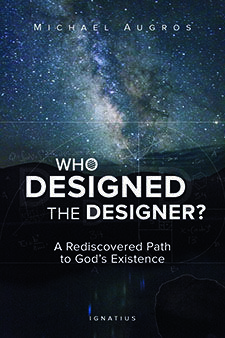Michael Augros saw a need for a fresh approach in the intelligent design debate. His new book, “Who Designed the Designer? A Rediscovered Path to God’s Existence” published by Ignatius Press, employs the philosophical traditions of Aristotle and St. Thomas Aquinas and does not enter into debate at all.
The battle to prove or refute the existence of God by the New Atheists and the proponents of intelligent design is mostly waged in attack and defense of evidence. Michael Augros, professor at Thomas Aquinas College, takes a non-polemic approach, drawing readers along a reasoned pathway of general principles in order to see God’s handiwork for themselves.
Augros relies on examination of general principles that can be demonstrated to be universally true, rather than delving into proofs from modern empirical science. “The arguments from cutting-edge science being made for the existence of God are really remarkable and worth pursuing, but there are a lot of books like that out there already,” he said.
“To prove the existence of God starting from empirical science, you ask the reader to believe a bunch of things; to believe the scientists or author has the science right,” said Professor Augros. Proofs from science, like the Big Bang, are impossible for everyday people to verify on their own.
The general principles from ordinary experience which Augros uses are ones each reader can relate to from their own experiences.
“The reader doesn’t have to take anything on faith. By the end of the book a reader should be able to say, ‘Wow, I actually see that there is a God. I see how one gets there from my own life, from things that I can verify myself,’” Augros said.
Augros’ “spirit of wonder” was his inspiration. “I was overwhelmed by the beauty of the things I was seeing in philosophy, and in a way, not satisfied with the extent to which those things had been made known,” he said.
He was moved by “certain truths that are of deep importance to everybody, not just philosophers,” such as the existence of a God who is perfectly good, wise and eternal, and the immortal human soul.
“It’s possible to get to those profound truths that have all these amazing implications for everyone beginning just from things that everybody knows. Perhaps not everyone knows that they know these things,” said Augros. “It is possible to see that they are true with the help of sound philosophy,” he said.
His philosophical method leads the reader to see the handiwork of God in creation. From the point of seeing that there is a God through reasoning, the door of faith is left open.
“Philosophy can bring reason to the doorstep of faith, but it doesn’t push it through. Other things have to take over at that point,” said Augros. “You don’t drop reason at that point, but more than just the light of reason is required to enter into faith. The light of faith is required, which is a gift of God,” he continued.
Augros’ method doesn’t just aim to show that God exists, but what God is and his attributes must be. What is this being that exists all by itself? What is the divine mind and how is it different than ours?
“Most people, it seems to me, don’t have a clear notion of what God is. If you are supposed to love God with your whole heart, soul and mind, one should be interested in knowing what God is as well as possible,” Augros said.
Augros demonstrates the need for a First Cause, something which causes things without anything else causing it to do so. He refutes the idea of an infinite regression of causes.
“That is absurd on the face of it. If all causes are of the nature that they will not cause anything unless something causes it to do so, you will get no effects,” said Augros. This means that without the First Cause, creation could never begin.
Empirical scientific proofs can leave the impression of a “Divine Watchmaker” God who winds up the universe and leaves it to play out. The God that Augros draws out through deductive reasoning as the First Cause of all things is much different.
“Really, God is like to the universe as a singer is to a song. The singer can’t just sing the song and it just hangs there in the air and finishes by itself. As long as the song is going on, it is being sung. It is being produced by something,” he said Augros.
“Everything else receives its existence from God, not just to come to be, but to continue to be. He is the one in whom we live and move and have our being. That’s something that this book brings out. The God that we get to by the end of the book is the God who is upholding all things in existence as long as they exist.”
Although the book answers the attack points of the New Atheists, Augros’ said his intention was to write a book for believers to help others come into the faith.
“It is written primarily to help the believer, or someone who is searching, to see this beautiful truth that the existence of a divine and benevolent being is something perceptible and visible to us intellectually just from a contemplation of the things around us. That’s worth seeing in itself.”

